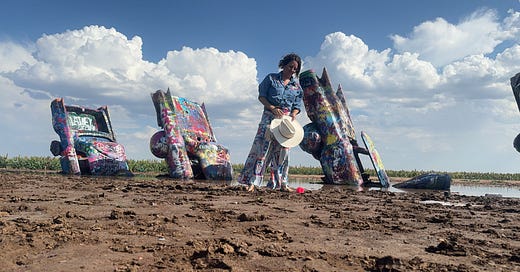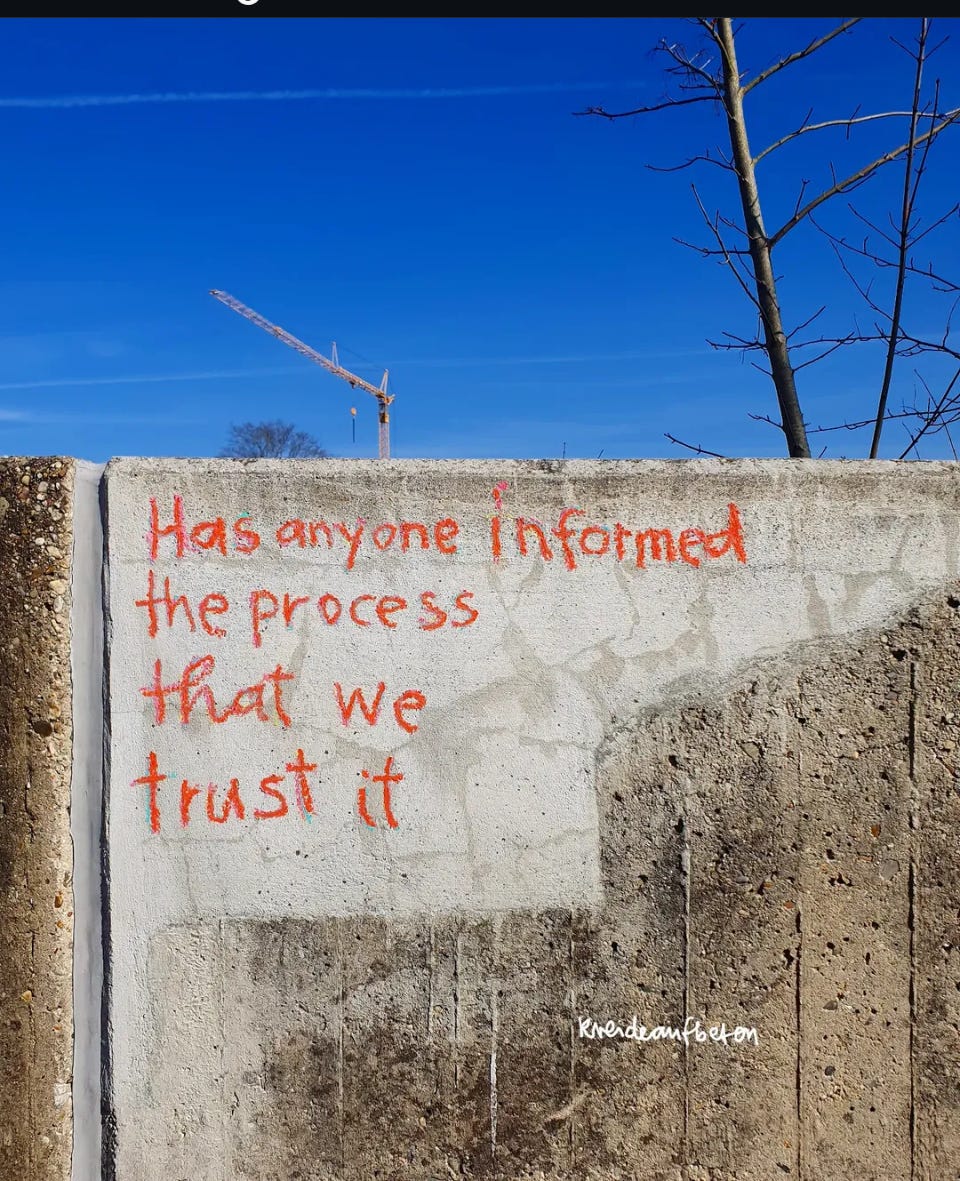Writing About Writing About Thinking.
"By God’s design, I believe our hearts and minds are shaped by story. It’s how we learn. It’s how we make sense of the world." ― Liz Curtis Higgs
Friends, I’m in a pickle.
I have been in a deep rumination cycle about this substack. The last story I wrote was more than just a story (more on that below), and I’ve been in a somewhat frozen position ever since, stymied by perfectionism, and also tripped up and tangled in thoughts about how my writing may or may not affect people around me. The days go by because there’s always something else to do, and because I haven’t created the perfect essay about it. This is the best I’ve got.
In November: I wrote about suicidal ideation.
It took me almost all of the four weeks (maybe six) to write “Birthdays in Boise.” It was the most honest I’ve written about that side of myself in a very long time, if ever before at all. I wanted to get it exactly right. It was very personal on multiple levels, and I was not prepared for the feeling of intimate exposure that vibrated through my body after I posted the story. It wasn’t exactly concern about what people “would think;” I worry about that too and recognize those familiar thoughts and feelings. This foreign sensation resounded in my chest plate and pulsed in my palms – it stung, like heartburn. Raw. (Another quote I considered using: “There is nothing to writing. All you do is sit down at the typewriter and bleed” Ernest Hemingway. A little heavy hitting, yes?)
I don’t have many paid subscribers, and I can’t know how many of that small number actually read it, so keep that in mind when considering the feedback I received:
25% responded positively and supportively, whether they related to it personally or not.
A smaller percentage, maybe 10% messaged me to thank me for describing a common parental experience so accurately.
One person expressed concern; they felt disturbed, and possibly worried for my well-being. And, based on probability as I understand it, it’s likely that at least one more person felt concerned in similar ways, but did not express it.
100% of my husband read it as well. He had some thoughts and feelings. This led to an interesting, uncomfortable, necessary conversation that was ultimately productive and beneficial. (The details of that are private. I signed up for this bloggy vulnerability; he did not!)
I don’t think I’m being too selfish when I say that it’s hard for a writer to balance honesty with consideration of the thoughts and feelings of others. There are times when a grievance is obvious and warranted. There are times it is not so clear, or depends on various factors, like where a reader stands on an issue, or if they have personal experience with the topic at hand. There are times when it’s controversial, and you can’t please everyone, and you have to write from your heart anyway. Birthday(s) in Boise Two Parts might have dipped a little into all of these things and also none of these things.
I do not want to upset anyone that I love.
I also do not want to sugarcoat the life-changing experience that The Everything’s Relative Road Trip provided me. How can I describe an existential transformation without exposing all of myself? It happened in my guts. You have to know the guts. But the guts might upset the people I love. A pickle.
Like everyone else on the planet, there are many facets to who I am, and it is exhausting trying to decide which is appropriate for when and where. There are boundaries about being a parent, being a therapist, being a podcaster, being a retreat facilitator, being a writer, being a wife; sometimes it’s a game of pickup sticks trying to find my truest self between all the lines. I don't always get it right. No one does. Whether it’s pumping gas, or interviewing for a job, or spending time with people we love, we are all deciding how much of our true selves need to be– or ought to be– a part of the process, and if it matters at all, and to whom. And by the way, the truest version of ourselves? It changes.
I feel extremely determined to write down an intimate transcript of the entire Roadtrip as I experienced it. It was suggested by a few, and I don’t necessarily disagree, that if it was all read as one total piece (like a book for example), the context of more personal pieces like Boise would hit differently. Weeks between each post might be too awkward, too scary, too upsetting, for some readers. What am I risking by asking my readers to tolerate this discomfort?
And what happens if I do not do it this way, or at all? I am, truly, trying to imagine how I would write this story without the difficult personal parts, or only the personal parts that are “acceptable.” The Everything’s Relative Roadtrip Substack would become a basic, somewhat dishonest, account of days on the road. Star date: 07 23 2024, Captain’s Log.
I am wondering if I can do it at all if I stop writing the substack entirely, and keep all the writing to myself until it's ready as a complete manuscript. We might all say that this is an obvious solution. Ostensibly, there’d be more time to prepare and process with the people involved. I’d need to create a productive structure for myself that isn’t based on outside validation or deadlines. Honestly, that feels hard and like another thing that will never get done, which makes me sigh with heavy sadness.
No decisions about any changes have been made. My therapist said, “You keep writing exactly like you’re writing.” No one– my husband most of all– has asked me to stop or change anything. Creative expression and creative decisions go out into the world, and it’s important to think about what power we have over how they’re received, and power we don’t have.
My friend Lydia wrote in her own substack recently, and I was moved by the depth and maturity she expressed about difficult things. Is this growing up? I sent her a message, and she wrote back “why are we silencing ourselves; we have to say the thing.” It hit me somewhere deep.
A few days later I was talking with bestie Sheridan Anderson; we were gabbing away, as we do. Something innocuous about being parents or therapists or women came up; I’m not kidding, friends, she said it word for word. “Just say the thing.”
I know when the universe is sending a clear signal. And yet.
Can I honor this truth, which will risk upsetting people (it will definitely upset some people), and is this the medium with which to do it? “Just say the thing” is not the end of this discussion.
Is it irresponsible to put these pieces into the world without any editing or guidance, this real time narrative that includes other people? I need an equation for determining the how and when of trigger-warnings and spoiler alerts are appropriate. (I did not kill myself on the Road Trip.)
Nothing is really raw anymore. Even reality shows are edited and gracefully shaped into something succinct before they are released to the public. What is the difference between bold and careless, and when does worrying about it ruin the whole experience anyway; am I risking my relationship(s) with people by demanding my freedom to create as/when/how I choose?
When I interviewed Dani Shapiro about Inheritance, she said she’d never have written the book if her dad was still alive. She said it without flinching, confident. I think about this often.
So here I am, without answers, holding the undeniable calling to write, but struggling with the uncertainty of how best to proceed. Confident and unflinching about my truth, BUT but but…lost in thought and concern about how it affects people. A pickle, indeed.
–Eve, March 2025
If you’ve read this far, you’re a hero. Please click on the “heart” below so I may keep track of reader-engagement. If you’re feeling especially heroic, leave a comment.
AND ANWAYS, as for the dispatch: we've left Boise, driving east. In a few days, I'll meet a half-brother.







I don't think you're alone in any of this, and it helps everyone else for you to share it in the vulnerable way you do. I've just reviewed a book for a small literary magazine and in this post you've confirmed my belief that, although the book is for writers, it's important to our community of NPEs and adoptees, too, because it's all about our right to tell our stories and stand in our own truth. I'll put something about it in Severance soon, but in the meantime, I think you'll find it helpful. It's called Permission: The New Memoirist and the Courage to Create by Elissa Altman @elissaaltman801481
I count on you to say the thing! All the things! I’ve learned so much from you! Thank you for daring greatly! ❤️